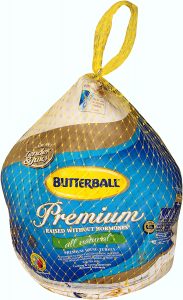BJ’s Wholesale Club Continues Free Turkey Promotion
 BJ’s Wholesale Club, a leading operator of membership warehouse clubs, will hold its annual free turkey promotion, helping members take advantage of incredible savings as they shop for their holiday essentials.
BJ’s Wholesale Club, a leading operator of membership warehouse clubs, will hold its annual free turkey promotion, helping members take advantage of incredible savings as they shop for their holiday essentials.
From Nov. 1 through Nov. 9, BJ’s members will be eligible to receive a digital coupon for a FREE fresh or frozen Butterball whole turkey when they spend $150 in the same transaction, in-club or online.
The free turkey coupon will appear in members digital coupon gallery beginning Nov. 11, and must be redeemed by Nov. 22, while supplies last. To qualify, members will need to create a digital account on BJs.com, so that they can clip their free turkey offer in their coupon gallery, either through the BJ’s mobile app or online at BJs.com.
“We are proud to continue our tradition of free Thanksgiving turkeys,” said David Rajkovich, Vice President, Food Merchandising, BJ’s Wholesale Club. “We always provide unbeatable value, and our free turkeys provide another way for families to save on their Thanksgiving celebrations.”
At BJ’s Wholesale Club, members will also find a wide assortment of fresh food, deli items, pantry essentials, delectable desserts, entertaining sets, homeware and so many more holiday must-haves, all in an easy one-stop shop:
- Wellsley Farms Sweet Potatoes, 3 lbs., available in-club and with curbside pickup, in-club pickup and same-day delivery
- Wellsley Farms Fresh Gourmet Carrots, 2 pk./1 lb., available in-club and with curbside pickup, in-club pickup and same-day delivery
- Wellsley Farms Signature Cheese Sampler, 32 oz., available in-club and with curbside pickup, in-club pickup and same-day delivery
- Wellsley Farms Seven Flavor Cheesecake Platter, 54 oz., available in-club and with curbside pickup, in-club pickup and same-day delivery
- Wellsley Farms Homestyle 9” Apple Pie, 3 lbs., available in-club and with curbside pickup, in-club pickup and same-day delivery
- Berkley Jensen 16 pc. Drinkware Set, available in-club and with curbside pickup, in-club pickup and same-day delivery
- Berkley Jensen 16 pc. Round Glass Food Storage Set with Airtight Locking Lids, available in-club and with curbside pickup, in-club pickup and same-day delivery
BJ’s members can shop how they want by choosing from a variety of convenient shopping options such as in-club shopping, curbside pickup, in-club pickup, same-day delivery, ExpressPay, and standard delivery from BJs.com. While checking off everything on their holiday checklists, members can also take advantage of BJ’s additional services like Same-Day Select and Buy Now, Pay Later payment options.
BJ’s Wholesale Club will be closed Thanksgiving Day but will re-open its doors, chainwide on Friday, November 24 at 7:00 a.m. so that members can take advantage of the club’s unbeatable holiday savings.
BJ’s Wholesale Club Holiday Hours:
- Thanksgiving Day, Nov. 23: Closed
- Black Friday, Nov. 24: 7 a.m. open
- Sunday, Dec. 24: 8 a.m. open
- Monday, Dec. 25: Closed
- Sunday, Dec. 31: 8 a.m. open
- Monday, Jan. 1: 9 a.m. open
Additionally, some clubs will have extended closing hours prior to Thanksgiving and throughout the holiday season to allow members extra time to complete their shopping trips. Check with your local club or visit BJs.com/locations for more details.
To learn more about BJ’s Free Turkey Promo, visit BJs.com/FreeTurkey.
For more news of interest to the meat and poultry industry, subscribe to Gourmet News.
Islamic Scholars Declare Cultivated Meat May Be Halal
 A group of leading Islamic scholars has advised GOOD Meat, the cultivated meat division of food technology company Eat Just, Inc., that real meat made from cells, without raising and slaughtering animals, can be halal if production meets certain criteria. Answering this theological question is a meaningful step forward for international acceptance of cultivated meat since halal consumers represent about 25 percent of the world’s population.
A group of leading Islamic scholars has advised GOOD Meat, the cultivated meat division of food technology company Eat Just, Inc., that real meat made from cells, without raising and slaughtering animals, can be halal if production meets certain criteria. Answering this theological question is a meaningful step forward for international acceptance of cultivated meat since halal consumers represent about 25 percent of the world’s population.
This landmark Shariah opinion from a trio of well-respected scholars in Saudi Arabia comes as cultivated meat begins to enter commerce in the United States and consumers around the world are learning how meat made in this new way can help address global food systems challenges connected to climate change, food safety, food security and animal welfare. With the Muslim population rapidly increasing, so too is their meat consumption. The global halal meat market was a $202 billion business in 2021 and is estimated to reach $375.05 billion by 2030, according to some estimates.
The Shariah scholars reviewed documentation prepared by GOOD Meat and attorneys at AlDhabaan & Partners in association with Eversheds Sutherland that described how cultivated chicken, the company’s first product, is made. The panel studied details about how the cells are sourced and selected, the ingredients fed to the cells to stimulate growth, how the cells are harvested and how finished products are manufactured.
GOOD Meat also engaged the Halal Product Advisory, a division of Halal Product Development Company, a fully owned subsidiary of the Public Investment Fund of Saudi Arabia, to advise and assist the company with the official process for halal pre-certification in Saudi Arabia and globally.
The scholars concluded that cultivated meat can be halal under the following conditions:
- The cell line is from an animal that is permissible to eat, such as a chicken or a cow
- The animal the cell line is extracted from is slaughtered according to Islamic law
- The nutrients fed to the cells are permissible to eat, and do not include any substances that are forbidden to be eaten such as spilled blood, alcohol or materials extracted from animals that have not been slaughtered properly or pigs
- The cultivated meat is edible and that it does not harm human health, and this is confirmed by referring to specialists, such as a country’s food regulatory agency
GOOD Meat’s chicken cell line and production process that were approved by regulators in the U.S. and Singapore do not yet meet the above criteria, however, with this clarity the company will work on a process to meet the halal guidelines moving forward.
“If cultivated meat is to help address our future food system needs, it has to be an option for the billions of people around the world who eat halal. This landmark ruling provides much needed clarity on how to ensure that is achieved. All companies should work to build a process to meet these guidelines,” said GOOD Meat co-founder and CEO Josh Tetrick.
The above ruling is a positive sign for cultivated meat companies that want to serve areas of the world with large Muslim populations, like the Middle East. In fact, a recent poll of more than 2,000 consumers in six key Middle East countries found that a vast majority of respondents would purchase cultivated meat and switch to it from conventional meat, assuming it was halal, sold at a comparable cost and tasted the same as what they are used to. The GOOD Meat-commissioned study released at last year’s United Nations Climate Change Conference polled consumers in Saudi Arabia, Qatar and other countries in the region.
In the poll conducted by PSB Insights, a leading independent consulting firm, climate messaging was one of the most effective tools to influence purchase intent. A recent article in the journal Frontiers in Nutrition sheds some light on that motivation, pointing out that eating halal cultivated meat may be considered by some as a step toward Khilafa (guardianship of nature). The authors note that “adoption of a diet with a lower environmental impact, via consumption of alt protein products, may be considered a way to uphold at least two of the five key principles: the preservation of life and linage.”
The Shariah scholars who issued the new opinion included:
Sheikh Abdullah AlManea
Sheikh Abdullah AlManea is a well-respected Shariah scholar both nationally and internationally. He has been a member of the Senior Scholars Committee in the Kingdom of Saudi Arabia since 1971, as well as an appointed member of the International Islamic Fiqh Academy. He was the former President of the Makkah Al-Mukarramah Courts, and currently sits on the Shariah advisory board of many banks in the Kingdom. He is also an advisor to the Royal Saudi Court. His expertise in Islamic jurisprudence has positioned him as a sought-after authority in issuing fatwas (Islamic legal rulings).
Professor Abdullah al-Mutlaq
Professor Abdullah al-Mutlaq is a prominent Shariah scholar and a member of the Senior Scholars Committee in the Kingdom of Saudi Arabia. He was the former head of the Department of Comparative Jurisprudence at the Higher Judicial Institute and is currently an advisor to the Royal Saudi Court. He has made significant contributions to the fields of Islamic jurisprudence, education, and public service. His scholarly work has enriched Islamic libraries and has been cited in academic circles.
Professor Saad Al-Shathry
Professor Saad Al-Shathry is a distinguished Shariah scholar. He is an advisor to the Royal Saudi Court, member of the Senior Scholars Committee in the Kingdom of Saudi Arabia, as well as a current member of the Permanent Committee of Ifta’a. He is the author of over 60 books and has published more than 10 articles in scholarly journals. He is known for his advocacy of moderation and balanced interpretation of Islamic teachings, and his influence extends far beyond the Kingdom, reaching a global audience.
For more news of interest to the specialty food industry, subscribe to Gourmet News.
GOOD Meat Gets OK for Cultivated Chicken Sales in US
 GOOD Meat, the cultivated meat division of food technology company Eat Just, Inc., has received approval from the U.S. Department of Agriculture for its first poultry product, cultivated chicken, to enter interstate commerce. This landmark clearance means the firm’s chicken, which is made directly from animal cells, can now be sold to American consumers.
GOOD Meat, the cultivated meat division of food technology company Eat Just, Inc., has received approval from the U.S. Department of Agriculture for its first poultry product, cultivated chicken, to enter interstate commerce. This landmark clearance means the firm’s chicken, which is made directly from animal cells, can now be sold to American consumers.
Today’s watershed moment for the burgeoning cultivated meat, poultry and seafood sector, and for the global food industry, comes on the heels of the USDA’s approval of GOOD Meat’s label – and four months after the company received its “no questions” letter from the U.S. Food and Drug Administration. The March milestone indicated the FDA accepted the company’s conclusion that its cultivated chicken is safe to eat and allowed the USDA to begin its part of the regulatory process outlined in a 2019 agreement between the agencies.
“This announcement that we’re now able to produce and sell cultivated meat in the United States is a major moment for our company, the industry and the food system. We have been the only company selling cultivated meat anywhere in the world since we launched in Singapore in 2020, and now it’s approved to sell to consumers in the world’s largest economy. We appreciate the rigor and thoughtfulness that both the FDA and USDA have applied during this historic two-agency regulatory process,” said Josh Tetrick, co-founder and CEO of GOOD Meat and Eat Just.
GOOD Meat won multiple regulatory approvals for its chicken in Singapore in 2020 and 2021, and in January 2023 received a key clearance that paves the way for greater scalability, lower manufacturing costs and a more sustainable product. Since its Singapore launch, the company’s chicken has been featured on menus at fine dining establishments, popular hawker stalls, via the foodpanda delivery platform and most recently by reservation at Huber’s Butchery, one of Singapore’s premier producers and suppliers of high-quality meats.
In the United States, under the Federal Meat Inspection Act and Poultry Products Inspection Act, all meat and poultry sold commercially must pass inspection to ensure that it is safe, wholesome and properly labeled. To accomplish this, USDA’s Food Safety and Inspection Service places inspectors in slaughterhouses and processing plants — and for the first time in history, will assign inspectors to GOOD Meat and other cultivated meat and poultry facilities that follow.
As part of the USDA’s approval, GOOD Meat received a grant of inspection for its demonstration plant in Alameda, California, as has its contract manufacturing partner, JOINN Biologics. The comprehensive vetting includes facilities and equipment; standard operating procedure for sanitation; and the systematic approach to identification, evaluation and control of food safety hazards known as HACCP.
Immediately after receiving the grant of inspection, production started for the first batch of cultivated chicken that will be sold to celebrated restaurateur and humanitarian Chef José Andrés. Andrés, who is owner of José Andrés Group, which operates more than 30 restaurants across the country, previously shared that a yet-to-be-disclosed restaurant in Washington, D.C., would be the first in the country to serve GOOD Meat’s cultivated chicken.
Additional Statements
“Serving as U.S. Secretary of Agriculture afforded me the opportunity to work with countless individuals at the USDA who were committed to accelerating agricultural innovation and economic opportunity as well as promoting initiatives to better nourish Americans and feed people around the globe. I commend the agency’s current leadership for working collaboratively with their FDA colleagues and the GOOD Meat team to reach this significant regulatory milestone. Today’s approval demonstrates that the United States is a global leader in the promising alternative protein space while also continuing to support family farmers’ efforts to feed the world through conventional food and agriculture techniques.” – Dan Glickman, GOOD Meat Advisory Board member; former U.S. Secretary of Agriculture and member of the U.S. House of Representatives
“Today’s groundbreaking announcement marks a pivotal moment in our journey towards building a safer, more efficient food system. GFI applauds U.S. regulatory agencies and GOOD Meat for their strong collaboration throughout this rigorous process. American consumers are now closer than ever to eating the real meat they love, that uses far less land and water than conventionally produced meat. By undergoing a comprehensive facility review process and meeting the highest regulatory standards, cultivated meat will provide consumers with a safe and trusted source of protein. As we navigate a future with increasing global demand for meat, it is crucial that governments worldwide prioritize cultivated meat as a solution that satisfies consumer preferences, supports climate goals, and ensures food security for generations to come.” – Bruce Friedrich, President, The Good Food Institute
“GOOD Meat’s grant of inspection is a historic moment for the global food industry as we prepare for the first cell-cultured/cultivated chicken products to be sold in the United States, following rigorous and science-based evaluations by the FDA and USDA. AMPS Innovation members continue to make ground-breaking advancements that will, in partnership with the entire food and agriculture sector, help meet increased demand for protein as the world’s population continues to grow.”– Robert Rankin, Executive Director, Association of Meat, Poultry, and Seafood Innovation
Eat Just is a food technology company with a mission to build a healthier, safer and more sustainable food system in our lifetimes. The company’s expertise, from functionalizing plant proteins to culturing animal cells, is powered by a world-class team of scientists and chefs spanning more than a dozen research disciplines. Eat Just created one of America’s fastest-growing egg brands, which is made entirely of plants, and the world’s first-to-market meat made from animal cells instead of slaughtered livestock. The company has been recognized as one of Fast Company’s “Most Innovative Companies,” Entrepreneur’s “100 Brilliant Companies,” CNBC’s “Disruptor 50” and a World Economic Forum Technology Pioneer. JUST Egg has been named among Popular Science’s “100 Greatest Innovations” and Fast Company’s “World Changing Ideas” and the history-making debut of GOOD Meat was heralded as one of 2020’s top scientific breakthroughs by The Guardian, Vox and WIRED.
For more information about the specialty food industry, subscribe to Gourmet News.








